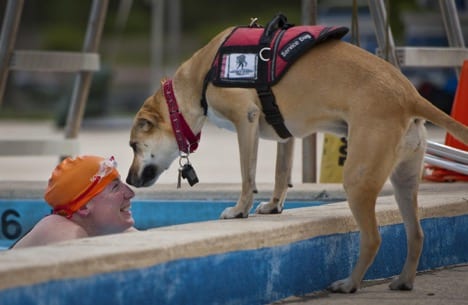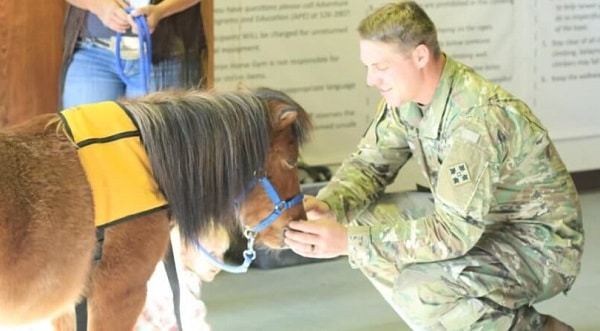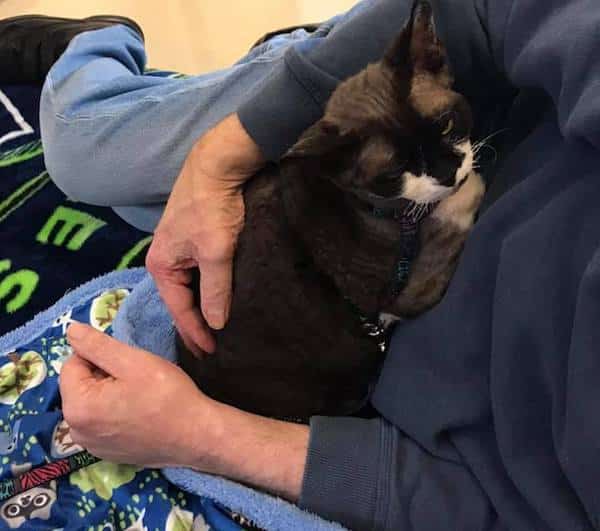



Post-traumatic stress disorder, or PTSD, is a mental health disorder that develops after experiencing or witnessing a traumatic event. Post-traumatic stress disorder can affect both children and adults. Events that can lead to PTSD include the following:

Intrusive memories, avoidance, negative changes in thinking and mood, and changes in physical and emotional reactions are the four main types of symptoms experienced by those with PTSD. These symptoms can drastically affect a person’s ability to participate in everyday life.
We’d like to take a brief look at animal-assisted interventions (AAI) and PTSD based on existing research. Public awareness of PTSD is often in the context of combat veterans, and much of the research into AAI and PTSD has been conducted in this population. However, PTSD can be present in other forms and in other populations.

Research supports the use of service dogs to decrease symptoms and increase quality of life for those with PTSD. Psychiatric service animals are defined as those individually trained to do work or perform specific tasks for people with mental health disabilities, such as PTSD. Some of these tasks include waking a person from nightmares, leading an individual to a building exit during an anxiety attack, grounding an individual through nudging, pawing, or leaning, and bringing medication to a person on command.
In a pilot study conducted by HABRI, the effects of service dogs on veterans with PTSD were explored. Compared to veterans without a service dog, veterans with PTSD paired with a service dog were found to have the following differences:
While providing a service dog to every individual with PTSD may seem like the answer to helping individuals with this diagnosis, it’s not that simple. Service dogs are in high demand and cannot become immediately available to every individual. It takes about two years to train a service dog, and it costs $20,000 to $30,000 to train a single psychiatric service dog; resources are not readily available to allow training of service dogs for every single person who could benefit from them. Therefore, alternative options should be explored. AAI supplied by volunteers with therapy animals is another evidence-based way to provide short-term benefits to numerous individuals with PTSD.
Therapy animals can be incorporated into PTSD treatment in a variety of ways. They can be present during therapy sessions with mental health providers, or can provide animal-assisted activities during visits to doctors’ offices, foster care programs, or assisted living facilities. A systematic literature review by Dr. Marguerite O’Haire collected

evidence supporting the use of animal-assisted activities for individuals with PTSD. Studies found that AAI for individuals with PTSD can have the following effects:
This research suggests that AAI offered by screened therapy animal teams like those registered by Pet Partners are a feasible option to assist clients with PTSD.
Our continuing education course Working with Veterans highlights strategies that can be used to effectively interact with a population that regularly experiences PTSD symptoms. Visit our Online Education page for more information and to sign up.

Our partnership with Veterans Administration is designed to bring therapy animals and the benefits of animal-assisted interventions to Veterans Health Administration facilities, which may include the opportunity to work with veterans who are receiving treatment for PTSD. This partnership allows for the option of registered therapy animals other than dogs visiting VHA facilities. Registered Pet Partners teams can learn more about this partnership and how to begin working with VHA facilities by searching for “veterans administration” in the Resource Library. VHA facilities interested in starting therapy animal visiting programs are encouraged to contact us for more information.
Our Animal-Assisted Crisis Response (AACR) training for registered Pet Partners volunteers provides education in mental health first aid and strategies for interacting with people who have experienced crisis that can also be helpful when providing AAI in contexts beyond crisis response. Visit our AACR page for more information.
If you work for a facility that would benefit from therapy animal visits to support clients with PTSD, we encourage you to post a volunteer opportunity. Pet Partners provides guidance for facilities on safe therapy animal visits during COVID-19.
Pet Partners supports the use of animal-assisted interventions as part of addressing mental health conditions, but we know that PTSD is multidimensional and benefits from a team treatment approach. The following resources provide more information about post-traumatic stress disorder symptoms, treatments, and support.